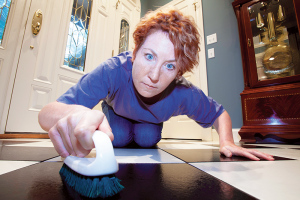Obsessive-compulsive disorder can paralyze one’s life
By Barbara Pierce
 Are you hooked on hand sanitizer? Is your closet beautifully organized? Or maybe you go back in the house three or four times to make sure you turned off the stove?
Are you hooked on hand sanitizer? Is your closet beautifully organized? Or maybe you go back in the house three or four times to make sure you turned off the stove?
When she stands up in front of the congregation on Sunday morning, my friend Rev. Sara becomes extremely anxious if the chairs aren’t lined up like perfect little soldiers marching along in perfectly even rows.
If any chairs are straggly, she can’t concentrate on what she wants to say, and stutters and stammers because she gets so anxious.
When are quirks like these just harmless quirks and when do they mean you have something more serious going on? Could you have obsessive-compulsive disorder?
OCD occurs when a person gets caught in a cycle of obsessions and compulsions. Obsessions are unwanted, intrusive thoughts or urges that trigger intensely distressing feelings. Compulsions are behaviors designed to rid oneself of obsessions and distress.
These symptoms can interfere with all aspects of life, such as work, school, and personal relationships.
Here’s how the International OCD Foundation describes it, online:
“Imagine that your mind got stuck on a certain thought or image … Then this thought or image got replayed in your mind over and over again no matter what you did …
“You don’t want these thoughts … Along with the thoughts come intense feelings of anxiety … It feels like you are in danger. Anxiety tells you to respond, react, and protect yourself — DO SOMETHING!
“Those tortured with OCD are desperately trying to get away from paralyzing, unending anxiety.”
OCD responds to both medication and psychotherapy.
When do OCD tendencies require professional help? It’s a matter of degree, how much your symptoms impact your daily life, how much they interfere with your functioning on the job and in relationships.
Watch for warning signs
Signs you may have OCD:
— Hand washing: Compulsive hand-washing or hand sanitizer use is common in OCD. It stems from a fear of germs, but can be fear of making others sick or of being impure.
When to seek help: If you think about germs often, worry that you’re not scrubbing well enough, or have fears about disease, your hand washing could be compulsive.
— Overzealous cleaning: People with OCD tend to clean compulsively, to ease germ phobia or feelings of impurity. Although cleaning can chase these thoughts away, relief does not last.
When to seek help: If you spend hours a day cleaning, it’s probably related to OCD. It’s really the consequence of stopping, say experts. If you don’t clean, you get anxious and fearful.
— Checking behavior: Returning three, four, or even 20 times to make sure the oven is off or the front door is locked are common. Like other compulsive behaviors, checking can be driven by a variety of obsessions, ranging from a fear of getting hurt to feelings of irresponsibility.
When to seek help: It’s normal to double-check something once in a while. But if checking interferes with your daily life, or becomes a ritual that you can’t do without, it could be a sign of OCD.
— Counting: Some people with OCD perform tasks according to a certain numeric pattern or count to themselves as they do everyday things.
When to seek help: When you can’t get numbers out of your head.
— Organization: People with OCD take organizing to the level of perfectionism. It has to feel just right, look just right, be symmetrical, or be the right number of items.
When to seek help: OCD enters in when “want to” becomes “have to”: People with OCD may not necessarily want to organize their desk but feel they must, to relieve their anxiety.
— Fear of violence: Everybody has fleeting thoughts about the possibility of violence or other misfortunes. The more we try to avoid thoughts like this, the more they pop into our heads, and this appears to be especially true for people with OCD.
When to seek help: It could be a sign of OCD if thoughts of getting mugged make you avoid the park, for example, or if concern for your mother’s safety spurs you to call her several times a day.
— Unwanted sexual thoughts: Like violent thoughts, recurring unwanted thoughts about inappropriate or taboo sexual behavior frequently occur in OCD, i.e. imagining one is going to grope a coworker or molest a child, or wonder if one is gay.
When to seek help: Changing your behavior as a result of these thoughts — avoiding gay friends or a coworker you’ve thought about sexually, for instance — is a red flag.
— Seeking reassurance: People with OCD try to soothe their anxiety by asking for the opinion of their friends and family.
When to seek help: If you catch yourself repeating the same question over and over — it could signal OCD.
If you think you may have OCD, talk to your doctor. If untreated, it can interfere in all aspects of life. Most symptoms respond well to treatment.
• Barbara Pierce is a retired licensed clinical social worker with many years of experience helping people. If you would like to purchase a copy of her book, “When you Come to the Edge: Aging” or if you have questions for her, contact her at barbarapierce06@yahoo.com.

